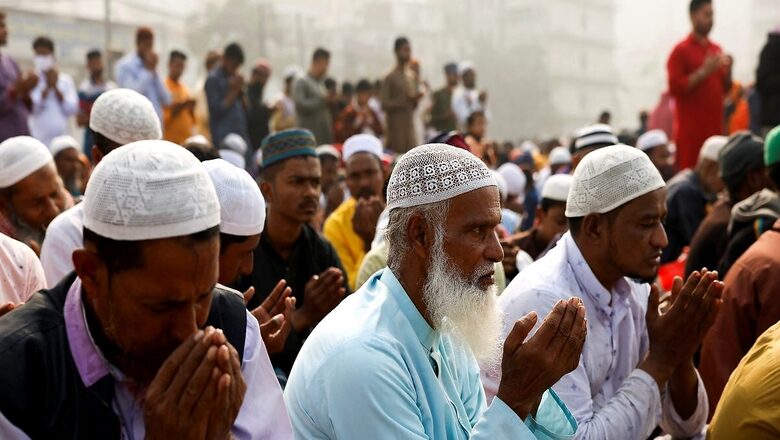
views
Since the 12th century, Muslims have pervaded in Telangana and Andhra Pradesh, making up more than 80 lakhs population in both states combined. Strangely, this region never had the influence of Hindutva ideology since the country’s independence but the condition of 90 percent of Muslims who belong to Pasmanda communities is politically, socially and economically marginalised.
The proponents of pseudo secular-regional-lingual allied with a handful of elite leaders, such as Ashrafs in the Muslim community and seized control of all the resources from the Pasmandas. Hovering at the bottom of all the areas, the majority of the Muslims are poverty-stricken and stand behind Scheduled Caste (SCs) and Scheduled Tribe (STs) in all sectors.
For many decades, the ruling governments of Congress, Telugu Desam Party (TDP) and Bharat Rashtra Samithi (BRS) continued to appeal to the Muslim community through elite leaders and religious clerics without narrowly focusing on the ground reality of Pasmandas. Only the Ashraf families benefitted from this and there was no participation from Pasmandas.
Who are Pasmanda Muslims?
During the mediaeval times, the native people belonging to Adivasis, Scheduled Caste and Backward Castes converted to Islam from Buddhism and Hinduism. They contribute 85 percent of the total Muslim population. Only 3-4 percent of Muslims are foreigners and around 10 percent are upper-caste converts. Hence, the majority of the Muslims belong to Indian origin and the ones left behind are called ‘Pasmandas’ or the ignored ones.
Today, in the states of Telangana and Andhra Pradesh, there are several examples of Muslim groups and individuals from various castes, such as Shaikhs, Patels, Achchukattalavandlu, Attar Saibulu, Nai Muslim, Laddaf, Doodhekala, Qureshi Kassab, etc.
Plight of Pasmanda Muslims
Presently, Pasmanda Muslims lack access to education, jobs, positions of importance, industry openings, land, etc. Unfortunately, 90 percent of the Muslim population doesn’t possess any kind of a particular occupation or any kind of employment in the organised sector.
After taking over the most important roles, the Ashraf leaders and religious clerics ran a narrative of a monolithic Muslim identity, forcing Pasmanda Muslims to give up their caste-based occupations. The plight of Pasmanda Muslims began to deteriorate over time, as their degrees of poverty and illiteracy rose. They were eventually forced to give away their expensive possessions.
Certain Muslim mystical teachings propagated the supremacy of the Syed caste and allowed them to control religious affairs, Waqf properties, and minority institutions that resulted in horrifying societal discrimination, extreme poverty, neglect and illiteracy among Pasmanda Muslims. They advocate that respecting a Syed is equal to respecting the family of Prophet Mohammad and dishonouring a Syed will invite God’s wrath. The leaders of Ashraf never desired Pasmanda to advance. They engaged Pasmanda in Hindu-Muslim disputes and projected the Rashtriya Swayamsevak Sangh (RSS) and the Bharatiya Janata Party (BJP) to be their biggest enemy. Nevertheless, in reality, they have caused more harm to the entire Muslim community, than anyone else.
Personal Experience
In August 2022, I collaborated with the Indian Political Action Committee (IPAC) on a political survey at the community level. I went to Illuru village in the Khammam district. The village is located on the border of Telangana and Andhra Pradesh. It has 2100 SC population and 400 Muslim populace. The Sarpanch of the village, Kota Rama Rao, a retired police officer, belonged to the SC Maala community and did his best to bring the Maalas and Madhigas in the hamlet together. Together, they constructed a community centre, where Babu Jagjivan Ram and Dr BR Ambedkar’s sculptures were placed side by side. All of them were well-educated and every household had at least one member working as a government employee.
The other side of the village had 90 Kutcha houses and one small Masjid belonging to the Muslim community. All of them were agricultural labourers who could speak only Telugu. I happened to meet the Imam of the Masjid, Subhan, a native of Bihar. Subhan told me that he was not paid Rs 8000 salary for two months because the Muslims in the village were very poor and could not afford his salary. He was thinking of relocating to a city.
There is no help from the minority institutions either. The level of ignorance is so high among those Muslim villagers that after returning from the fields in the evening, they sit on the veranda of the Masjid and drink alcohol. They don’t possess much land in the village, so they have to work as agricultural labourers. Some of them have moved to the cities to work as construction labourers. They lack religious knowledge and also professional knowledge which is necessary to live morally upright lives.
The Urdu-speaking Ashrafs residing in the urban areas disrespect the Pasmanda Muslims for speaking the Telugu language. They consider Urdu to be an Islamic language and they discriminate against people who speak other languages. These Ashraf preachers live lavish lives and glamorise poverty for Pasmandas. It’s high time for the Ashrafs to shun their supremacist attitude, and it’s also time for the Pasmandas to stand up for themselves and compete with the world.
Adnan Qamar is a social activist, speaker, election strategist and a student of law working for the upliftment of Pasmanda Muslims. He tweets under @TheAdnanQamar. Views expressed are personal.
Read all the Latest Opinions here




















Comments
0 comment